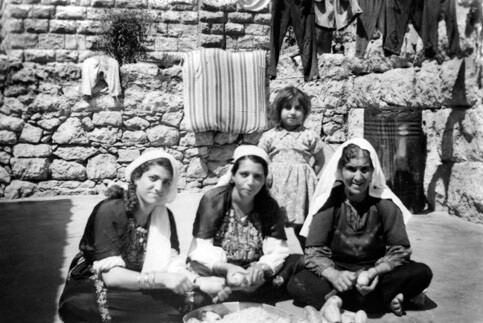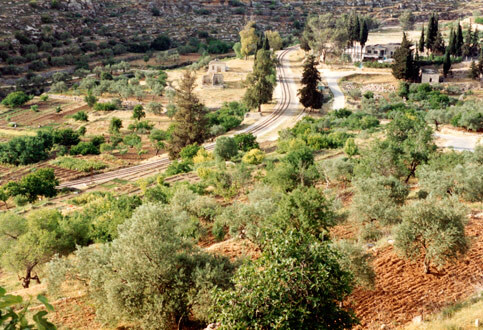
The author’s mother (right) with family members preparing food, early 1950s. (Photographer unknown)
Sixty years ago in Battir, my small hillside village near Jerusalem, I witnessed the chaotic collapse of the British Mandate administration in Palestine and the beginning of the Nakba.
The previous months had been decisive ones for the fate of Palestine, although we did not yet know it. The Jews, fed up with British procrastination in fulfilling Balfour’s promise of letting them transform our homeland into their “national home,” launched a bloody campaign of terror both against the British and the Arabs. The Jewish militias targeted the British to speed up their departure from Palestine, and hit the Arabs to quell the rising resistance to Zionist colonization. Violence broke out in early 1947, after the British announced that they would leave Palestine by 15 May 1948. When the United Nations passed its partition resolution on 29 November 1947, the violence began to lurch into full-scale war.
Battir’s 1,200 inhabitants were wracked by uncertainty. There were hopes that things would turn out all right, but fear dominated as the atmosphere became bleaker by the day.
I vividly remember the stories of horror which haunted the people of Battir, such as the attack on the railway station in Jerusalem on 21 October 1946. The train was their lifeline to the city where they marketed their produce and bought their supplies. People also walked to Jerusalem and often traveled by car on the unpaved road that ran parallel to the railway line, though that was much harder. A few months earlier a Jewish bomb attack on Jerusalem’s King David Hotel, which served as the British headquarters, killed 91 people and injured dozens. Later, after the partition vote, when the Zionist forces began their armed campaign to seize Palestine, fighting erupted between Arabs and Jews in the land they both claimed.
The gunfire and chaos edged ever closer to Battir, a village that traces its roots to the second century, and which now found its peace and tranquility under threat.
Apart from home just up the hill, the center of my life was at the elementary school for boys, that I attended, and that lay at bottom of the valley that Battir overlooks. Just next to the school was the railway station which was the first stop on the railway line from Jerusalem to Jaffa. The station and the school with its small football field formed a sort of campus at the edge of the village, surrounded by tall pine and citrus trees providing ample greenery and shade on hot summer days. For us children it was the perfect place to play and loiter in and out of school hours.
I remember these as the lively, busy places they once were with schoolchildren, the station staff, and at one point a British military garrison. Families would take the train down from Jerusalem to enjoy weekly picnics in the romantic rural atmosphere of our village and they would be joined by local people doing the same. At school we experimented with practical agriculture which was part of the curriculum; this included keeping beehives for honey and breeding chickens.

A view of the Jerusalem-Jaffa railway line as it runs along the valley below the village of Battir in the Israeli-occupied West Bank. Ruined station buildings can be seen to the left of the track, while the village elementary school can be seen to the right. (Photographer unknown)
Villagers, adults and children alike, never tired of the spectacle of the steam engines stopping to fill their huge tanks with water, and bringing with them all kinds of people to spark local curiosity. Villagers would sell fruit and vegetables to passengers through the carriage windows — a small but steady source of badly needed income.
The nearest village to Battir was al-Walajah, just less than two miles north, and across the railway line to the west. People from the neighboring villages mixed and intermarried freely.
During the last days of the Mandate all this began to change. Cargo trains became the targets of robbers who forced them to stop along the line and emptied them of all their valuables. British soldiers on board the trains, supposedly to guard them, hardly offered any resistance; they often dropped their arms and left the scene peacefully. Soon the trains stopped coming completely, and when the trains stopped everything else fell apart too. The station offices and the station manager’s house were ransacked, and so was our school. There was no law or authority to protect people’s lives and property. We had to look after ourselves.
By this time the well-documented and carefully organized campaign of ethnic cleansing by the Haganah and other Jewish militias had begun, with the goal of conquering as much land as possible from the Palestinians so that the state of Israel could be established. One wave after another of people from Jerusalem-area villages, fleeing Jewish attacks, started to arrive in Battir, seeking shelter and safety. People received them hospitably, believing it was only a temporary crisis. But as one village after another fell to the Jewish forces, and the front line approached us, we too had to leave for safety.
That was soon after news of the April 1948 massacre in the village of Deir Yassin reached us. As Deir Yassin was not far away, some of the survivors arrived in Battir. They told of the horror they witnessed and the futile attempts to resist the onslaught. As the Jewish attackers intended, their deeds instilled terror in the hearts of Palestinians.
One afternoon in May 1948, Battir fell under heavy fire from the opposite slopes, across the railway line to the west, which had fallen to the Jewish fighters. We carried whatever belongings we could and headed east a few miles where there were vineyards and a small spring. I was only with my mother and my younger sisters; all the other members of my family had left separately. We too thought it would be a short escape, but we camped in that vineyard with many other people from the village all summer, our hopes dimming as the heat rose.
At first we slept in the open, under the trees. Then we built small shelters out of branches in an attempt to gain some privacy. We cooked and baked bread on an open fire. The one great relief is that the spring gave us a reliable supply of fresh water, but otherwise life was very difficult and dreadfully uncertain. When people started to fear that our departure might not be temporary, some of them risked their lives to return to the village to recover whatever belongings they could.
By the end of the summer, with life under the trees becoming unbearable, people started to disperse in every direction. Many joined refugee camps in the Jordan Valley. My mother, my younger sister and I went to Bethlehem where we joined my older brother who had previously been an officer in the Palestine police and had now joined the Jordanian army. In his tiny officer’s apartment, as well as us, he ended up sheltering my eldest sister and her large family as well as his own. It was hard, but we were grateful. We stayed in Bethlehem until the summer of 1949 when the war was ended by the armistice agreement.
Battir lay right on the ceasefire line, and it was now physically divided by barbed wire. Unlike hundreds of thousands of other Palestinians forced out of their villages, we did return home. But there we faced a totally new situation.
[PART 2…]
Hasan Abu Nimah is the former permanent representative of Jordan at the United Nations. This article first appeared in The Jordan Times and is reprinted with the author’s permission.





